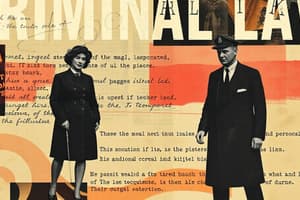Podcast
Questions and Answers
What is the main legal definition of a crime?
What is the main legal definition of a crime?
- An act that is approved by society as beneficial
- A behavior that deviates from cultural norms
- An act or omission that is prohibited by criminal law (correct)
- A social interaction that results in harm
Which of the following concepts represents the intent to commit a crime?
Which of the following concepts represents the intent to commit a crime?
- Mens rea (correct)
- Actus reus
- Legal defense
- Social harm approach
What does the term 'actus reus' refer to in the context of crime?
What does the term 'actus reus' refer to in the context of crime?
- The moral justification for breaking a law
- The authority responsible for enforcing laws
- The physical act or omission that constitutes a crime (correct)
- The societal norms that define criminal behavior
Which entity has the exclusive jurisdiction to create and amend criminal code in Canada?
Which entity has the exclusive jurisdiction to create and amend criminal code in Canada?
How is the legal status of behaviors often determined?
How is the legal status of behaviors often determined?
What is an example of a failure to act that may constitute a crime?
What is an example of a failure to act that may constitute a crime?
Which concept illustrates the relationship between intention and the action of committing a crime?
Which concept illustrates the relationship between intention and the action of committing a crime?
In what scenario might legislation change regarding the criminalization of behaviors?
In what scenario might legislation change regarding the criminalization of behaviors?
What best describes a zombie law?
What best describes a zombie law?
Which of the following best characterizes the relationship between social response and criminality?
Which of the following best characterizes the relationship between social response and criminality?
How do laws and justice differ?
How do laws and justice differ?
What does the concept of deviance entail in relation to society?
What does the concept of deviance entail in relation to society?
Which statement accurately reflects the essence of the rule of law?
Which statement accurately reflects the essence of the rule of law?
Which concept best illustrates the challenges of defining justice?
Which concept best illustrates the challenges of defining justice?
How can historical analyses contribute to our understanding of legislation?
How can historical analyses contribute to our understanding of legislation?
What is the primary goal of the justice system?
What is the primary goal of the justice system?
Flashcards are hidden until you start studying
Study Notes
Defining Crime
- Crime is a deviation from societal norms.
- Crime involves breaking a law, which is a piece of legislation created by those in power.
- What constitutes a crime can vary greatly depending on the society and its values.
- Crime is often based on a sense of morality, sometimes appealing to a higher power.
- There are various definitions of crime, including breaking the law and broader social harm.
Enforcing and Defining Laws
- The Criminal Code of Canada, outlining all federal crimes, is outlined in Sections 91 and 92 of the Constitution Act 1867.
- The federal government has sole authority to create, repeal, and amend criminal laws in Canada.
- The Criminal Code defines crime as an act or omission prohibited by law.
Actus Reus and Mens Rea
- Crime occurs when someone commits an act (actus reus) or fails to act (omission) with the intent to commit the act (mens rea).
- Omissions are less common than acts, but they exist in situations involving a duty of care, like with doctors, parents, and lifeguards.
- General intent, where mens rea is assumed, applies to crimes like assault and drug possession.
- Concurrence means the intention must align with the action or violation of law at the same time.
The Social Construction of Crime
- The social construction of crime recognizes that the legal status of behaviors is shaped by societal response, not inherent harmfulness.
- What is criminalized changes over time, as societal perceptions evolve, like with the legalization of marijuana.
- This understanding helps us grasp what constitutes crime and its variability across societies.
- The perception of crime is a complex interplay of economic, political, and social concerns.
- Some laws, known as "zombie laws," are technically illegal but not actively enforced due to lack of resources or priority.
Crimes and Context
- Crimes with clear-cut definitions, like murder, can become nuanced when considering self-defense, killing in war authorized by the state, or actions by law enforcement.
Laws vs Justice
- Law is a formal set of rules established to regulate behaviour.
- Justice, a broader concept based on fairness and equality, aims to address social injustices.
- While laws are created and enforced by the government, justice is subject to interpretation and may differ across individuals and societies.
Equality, Equity, and Justice
- Justice is an abstract concept connected to equity and equality.
- The justice system is designed to uphold legal systems and the values within them.
- The justice system aims to achieve fair and equitable outcomes.
Deviance vs Crime
- Deviance refers to behaviors contrary to societal norms and values, often subject to informal social control, like manners and customs.
- Deviance may be frowned upon but doesn't necessarily result in criminal charges.
- Over time, deviant behaviors that cause harm or damage property can be criminalized.
- Customs can change drastically; for example, in the 1950s, wearing a hat and gloves in church was expected.
Historical Analysis in Criminology
- Criminologists often analyze historical contexts to understand how social, economic, and political factors influence legislation.
The Rule of Law
- The concept of the rule of law dates back to 1215 CE.
- Under this framework, citizens give up certain freedoms in exchange for legal protection from the state.
- This framework relies on legal prosecution to safeguard individual rights and liberties.
Studying That Suits You
Use AI to generate personalized quizzes and flashcards to suit your learning preferences.




